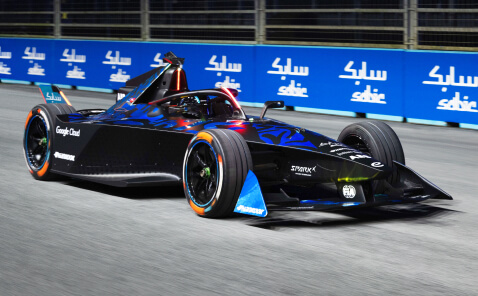
EVEN BETTER EVs
Electric vehicles play a central role in the shift to sustainable transportation. SABIC’s advanced materials are enabling next-generation powertrain technology so that EVs can be more efficient and travel longer distances between charges.
EVs are an important way to decarbonise transportation. Their technology is advancing quickly.
One breakthrough that’s changing this is the use of silicon carbide inverters in EV powertrains. All electric vehicles use inverters to convert the direct current (DC) produced by their high-voltage batteries into the alternating current (AC) that their motors need. Inverters also reverse this process during an EV’s regenerative braking, when the motor puts power back into the battery.
With technology based on silicon carbide, inverters can run at higher temperatures and convert power more efficiently. Battery range can be increased by 5-10% and EVs can be lighter in weight. However, silicon carbide adoption has been hampered by the use of low-temperature films in inverter modules that require energy-intensive active cooling.
SABIC’s new ELCRES™ HTV150A dielectric film is supporting the silicon carbide technology breakthrough. Capable of operating at up to 150°C, the material can be used in the design of high-voltage, high-temperature power capacitors for the latest EV inverters and onboard chargers. SABIC is partnering with a specialist in ultra-thin film extrusion to produce ELCRES HTV150A film.
Collaborations like this are bringing the sustainable future for transportation closer.


